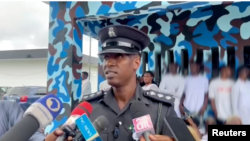Gay rights activists in Nigeria are criticizing the arrest and detention this week of dozens of people who attended a same-sex wedding. It is one of the biggest mass arrests in recent years targeting the country’s LGBTQ community.
A Nigerian police spokesperson said 67 people remained in custody on charges they broke the law by attending the same-sex wedding in the Delta state town of Ekpan.
The Delta state police said they received information about Monday’s wedding after officers on routine patrol Sunday randomly stopped one of the invited guests and interrogated him. It was not clear if he was stopped based on what he was wearing.
The police raided the wedding venue on Monday and rounded up the two grooms, along with guests.
Authorities also paraded the defendants before the media and said the accused will be made to face the law.
"We already have the remand warrant from the court to still have them in custody because we still have more evidence to bring up together,” Bright Edafe, the Delta state police spokesman, told VOA by phone, “but by the end of this week, they'll be charged to court."
Edafe said police recovered materials, including hard drugs and gay marriage ceremonial dresses, during the raid.
If convicted, the defendants face 14 years’ imprisonment, according to an anti-homosexuality law that went into effect in 2014. Police said others accused in the case will be jailed for 10 years if convicted.
The latest arrests come five years after police raided a hotel in Lagos and arrested 57 men for homosexuality.
But criticism has been growing following the latest incident. Rights group Amnesty International condemned the arrests in a statement on X, the platform formerly known as Twitter, and asked authorities to "put an immediate end to this witch-hunt."
The group said that the arrests discriminated based on perceived sexual orientation and gender identity, and that Nigeria's law was being increasingly used by officers to harass, blackmail and extort victims.
"Basic rights of privacy, freedom of association has been rolled back, and it's worrying because you don't see public pushback against this,” said Kayode Somtochukwu Ani, founder of Queer Union for Economic and Social Transformation. “And because these human rights abuses are launched on minorities, particularly minorities … the state knows that they can drum up moral panic about [it]."
Edafe said he disagrees with activists defending the detainees.
"If Amnesty International knows what they're doing, they'll know that there's a law in this country that prohibits gay marriages, so calling the same government who put that law in place to take action, I wonder what kind of action they're requesting,” he said. “This is Nigeria, and whomever must live in this country must live by the laws of the land."
Homosexuality is widely viewed as a Western import in many parts of Africa, including Nigeria.
In May, Uganda passed a law that punishes homosexuality by imposing the death sentence, despite pressure from Western governments and rights organizations. Two men this week were charged under the new law for what authorities called "aggravated homosexuality."





